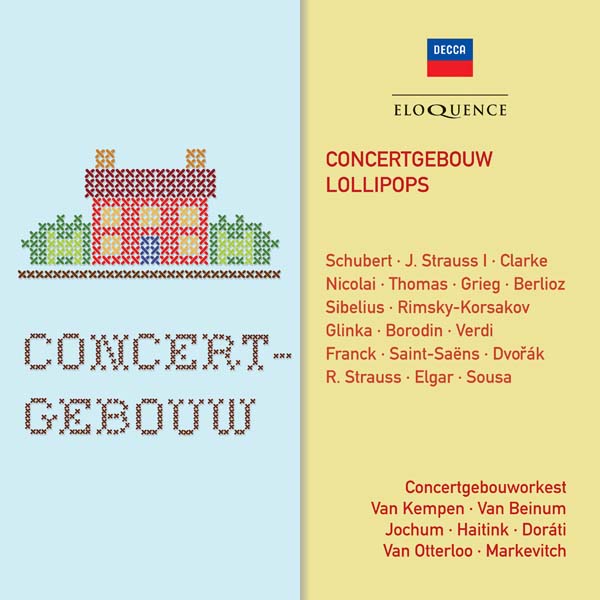This highly appealing collection of light-orchestral classics, gathers up eighteen years in the history of one of the world’s most celebrated orchestras during the golden age of the LP.
Ever since its foundation in 1883, the Concertgebouw Orchestra of Amsterdam has been blessed with a hall that to all intents and purposes, belongs to them. Unlike many of their rivals, they not only perform but rehearse and record in the hall. The hall’s own superb acoustic has always been a further attraction for record companies and between 1950 and 1968 microphones were frequently set up to record the orchestra.
Those microphones mostly belonged to Decca and to the fledgling local Philips company. On the podium were not only its music directors – during this period, Eduard van Beinum and, from 1961, Bernard Haitink – but also celebrated guest conductors. There were long-established maestros and friends of the orchestra such as Eugen Jochum, Paul van Kempen and Willem van Otterloo but also younger, dynamic maestros including Antal Dorati.
When recording sessions went well and the main works were in the can ahead of schedule, the time was not wasted but filled with shorter pieces. These would both conveniently fill out a short-measure LP and be guaranteed enticements to the ever-growing market of consumers though in some cases, the reserve pieces were only released on a 45-rpm record, which sometimes disappeared from the catalogue after a short period.
Many of those recordings, often made on the hoof with a delightful spontaneity that shines through even now, are gathered on this set for the first time. Typical of them is ‘The Stars and Stripes Forever’. This was put on tape one day in September 1958 without rehearsal, played straight through, and at the end Van Beinum addressed the orchestra: ‘Now that, gentlemen, is a recording!’
Sometimes the juxtapositions of conductor and repertoire are immediately arresting: not only Van Beinum in Sousa but Haitink in Glinka and Verdi. The waltz-suites from ‘Der Rosenkavalier’ play to Jochum’s under-rated strengths as an operatic conductor. Igor Markevitch conducts the ‘Polovtsian Dances’ and ‘Russian Easter Festival Overture’ to the manner born.
The booklet includes an informative and insightful note by Niek Nelissen as well as cover illustrations of the LPs and EPs that gave rise to this unique collection.
CONCERTGEBOUW LOLLIPOPS
CD 1
FRANZ SCHUBERT: Marche militaire No. 1 (orch. Guiraud)*
JOHANN STRAUSS I: Radetzky March*
Paul van Kempen
JEREMIAH CLARKE: Trumpet Voluntary*
OTTO NICOLAI: Die lustigen Weiber von Windsor: Overture*
AMBROISE THOMAS: Mignon: Overture*
EDVARD GRIEG: Two Elegiac Melodies, Op. 34*
HECTOR BERLIOZ: Le Carnaval romain: Overture*
JEAN SIBELIUS: Finlandia, Op. 26 No. 7
Eduard van Beinum
MIKHAIL GLINKA: Ruslan and Lyudmila: Overture*
Bernard Haitink
NIKOLAI RIMSKY-KORSAKOV: Russian Easter Festival Overture, Op. 36
ALEXANDER BORODIN Polovtsian Dances (from Prince Igor,
arr. Rimsky-Korsakov)
Igor Markevitch
CD 2
GIUSEPPE VERDI: La forza del destino: Sinfonia*
HECTOR BERLIOZ: Benvenuto Cellini: Overture*
Bernard Haitink
CESAR FRANCK: Les Éolides
Willem van Otterloo
CAMILLE SAINT-SAËNS: Danse macabre, Op. 40*
ANTONIN DVOŘÁK: Scherzo capriccioso, Op. 66*
Bernard Haitink
RICHARD STRAUSS: Der Rosenkavalier: Suites of Waltzes*
Eugen Jochum
EDWARD ELGAR: Pomp and Circumstance March No. 1*
SOUSA: Semper fidelis*
Antal Dorati
JOHN PHILIP SOUSA: The Stars and Stripes Forever*
Eduard van Beinum
Concertgebouworkest
*FIRST INTERNATIONAL RELEASE ON DECCA CD
Recording Producers: John Culshaw (Trumpet Voluntary); Jaap van Ginneken (Die lustigen Weiber von Windsor, Mignon, Finlandia, Two Elegiac Melodies, Carnaval romain, Pomp and Circumstance, Semper fidelis, Stars and Stripes, Russian Easter Festival, Prince Igor, Rosenkavalier waltzes, Danse macabre, Ruslan and Lyudmila, La forza del destino, Benvenuto Cellini, Scherzo capriccioso Les Éolides); unknown (Marche militaire, Radetzky March)
Recording Engineers: Kenneth Wilkinson (Trumpet Voluntary); Gerard Janszen, Co Witteveen (Russian Easter Festival, Prince Igor); Henk Jansen, Bruno Taschner (Die lustigen Weiber von Windsor, Mignon); Henk Jansen, Cees Huizinga, Willem van Leeuwen (Finlandia, Two Elegiac Melodies, Pomp and Circumstance, Semper fidelis, Stars and Stripes); Henk Jansen, Co Witteveen (Danse macabre); Henk Jansen (Carnaval romain, Les Éolides); Hans Lauterslager, Co Witteveen, Henri de Frémery (Rosenkavalier waltzes); Cees Huizinga, Gerard Janszen (Ruslan and Lyudmila); Henk Jansen, Co Witteveen, Gerard Janszen (Scherzo capriccioso); unknown (Benvenuto Cellini, Marche militaire, Radetzky March)
Recording Location: Concertgebouw, Amsterdam, The Netherlands, 5 December 1950 (Marche militaire, Radetzky March), 19 May 1952 (Trumpet Voluntary), 24–25 September 1956 (Carnaval romain), 10 April 1956 (Die lustigen Weiber von Windsor, Mignon), 7 June 1957 (Finlandia), 1–3 May 1958 (Two Elegiac Melodies), 27 September 1958 (Stars and Stripes), 25 September 1959 (Pomp and Circumstance, Semper fidelis), 5–7 September 1960 (Rosenkavalier waltzes), 10–12 September 1962 (Danse macabre), 27 September 1963 (Scherzo capriccioso), 12 January 1964 (Les Éolides), 15–17 September 1964 (Russian Easter Festival, Prince Igor), December 1964 (La forza del destino), 24 December 1965 (Ruslan and Lyudmila), 23 September 1968 (Benvenuto Cellini)
Remastering Engineer: Paschal Byrne (Audio Archiving Company)
‘The Borodin Dances are up to the splendid and exciting standards reached by Markevitch in his Tchaikovsky symphony recordings.’ (Polovtsian Dances) Fanfare, May 1981
‘A remarkably successful performance, It is exciting and it hangs together as a whole … The sound is very good indeed.’ (Finlandia)
‘The strings sound really lovely and the performance has sentiment enough but is never overdone.’ (Elegiac Melodies) Gramophone, November 1960
‘All three of the flamboyant overtures newly issued are beautifully done.’ (Benvenuto Cellini, Ruslan and Ludmila, La forza del destino) Gramophone, March 1971

